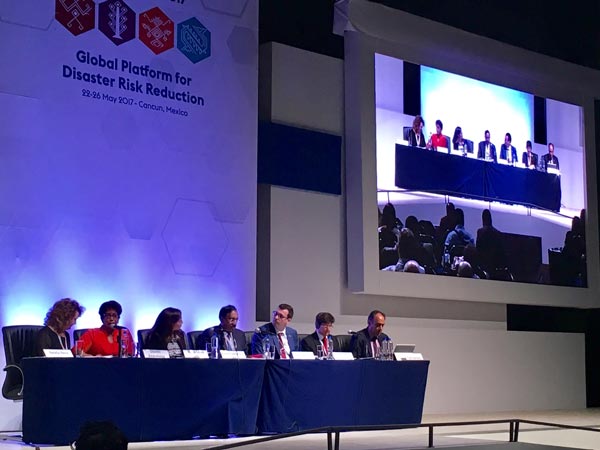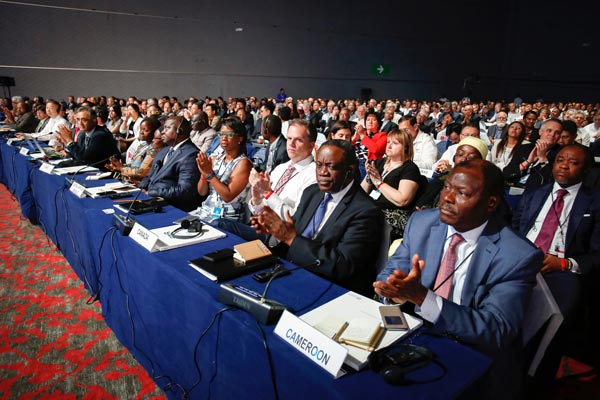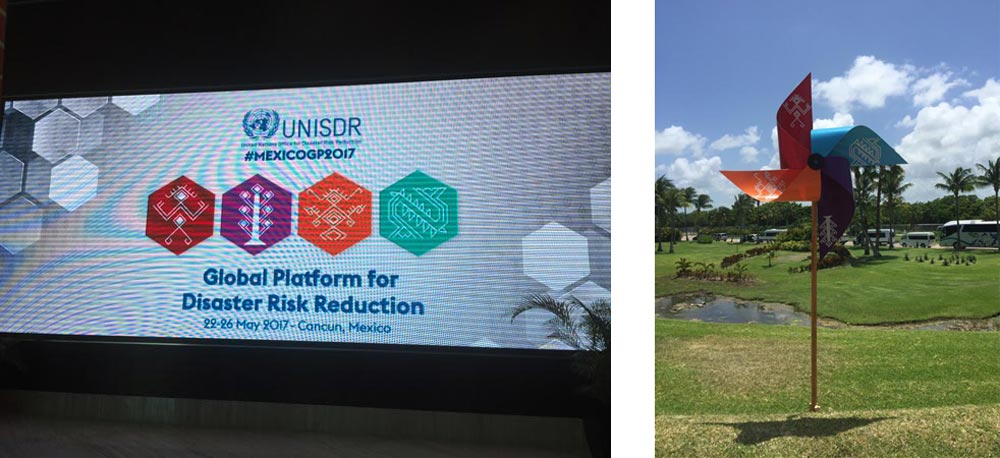Professors Dilanthi Amaratunga and Richard Haigh were the Co-organisers and Focal points of the Main Session “Disaster Risk Reduction Governance” held at the United Nations Global Platform recently held from 22 – 26 May 2017 in Cancun, Mexico.
 Disaster Risk Reduction Governance session panel
Disaster Risk Reduction Governance session panelThe terminology agreed by countries for the Sendai Framework defines disaster risk governance as the “system of institutions, mechanisms, policy and legal frameworks and other arrangements to guide, coordinate and oversee disaster risk reduction and related areas of policy”. Some of the characteristics of good governance in disaster risk refer to the need to be “transparent, inclusive, collective and efficient to reduce existing disaster risks and avoid creating new ones”. Disaster risk governance at the national, regional and global level, is thus of great importance for an effective and efficient management of disaster risk. Clear vision, plans, competence, guidance and coordination within and across sectors, as well as participation of relevant stakeholders, are essential elements for effective prevention, mitigation, preparedness, response, recovery and rehabilitation.
This session elaborated on some of the challenging issues of disaster risk governance and also serve as an opportunity to broaden the disaster risk governance discussion not only from a government perspective as the central organizing point but also to the totality of the ways in which communities are organized. Most importantly, the session shared successful experiences on this topic and also launched the first edition of the Sendai Framework “Words into Action” Implementation Guide on disaster risk reduction governance and accountability. The session also shared and solicit inputs on effective disaster risk reduction governance and accountability approaches. It was the intention that the session outcomes help countries and partners to move ahead with implementation of the Sendai Framework, in particular, the Priority 2 and in support of the achievement of the Target (e).
 Section of the audience
Section of the audienceProfessor Dilanthi Amaratunga was a panelist of this high level session along with Mr. Carlos Iván Márquez Pérez, Director National Unit for Disaster Risk Management in Colombia; María Luisa Romero. Minister of Government of Panama; Dr Fadi Hamdan, Managing Director. Disaster Risk Management Center (DRMC), Lebanon; and Ms. Natalia Ilieva, Executive Assistant to the Secretary General of Asia Pacific Broadcasting Union (ABU). Her interventions were on accountability as an entry point to disaster risk governance including the key enablers for accountability; the way WIA document can support countries in strengthening governance accountability for disaster risk reduction; and her recommendations for the role of multi-sectoral cooperation in ensuring coherence between Sendai Framework, sustainable development agenda and climate change agendas.
The 2017 UN Global Platform
The Global Platform for Disaster Risk Reduction (Global Platform), as recognized by the UN General Assembly, is the main forum at the global level for strategic advice, coordination, partnership development and the review of progress in the implementation of international instruments on disaster risk reduction. It was established in 2006 and is now the world's foremost gathering of stakeholders committed to reducing disaster risk and building the resilience of communities and nations.
The Global Platform is characterized by a format that facilitates dialogue and exchanges among all stakeholders, both governmental and non-governmental. It features a high-level dialogue which brings together senior government officials, including heads of state and government, ministers, mayors and parliamentarians and leaders from the private sector, science and civil society.
The 2017 Global Platform for Disaster Risk Reduction was held in Cancun, Mexico on 22-26 May. It was the first time the most important international forum dedicated to the disaster risk reduction agenda has been staged outside Geneva.
The Global Platform marked the first opportunity for the international community to review global progress in the implementation of the Sendai Framework for Disaster Risk Reduction, which was adopted in Japan in 2015. More than 5,000 participants took part, including policy makers and disaster risk managers.

